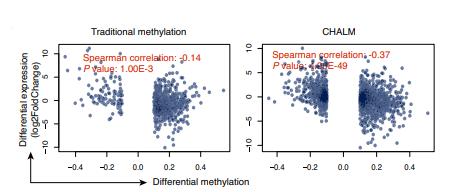CHALM method helps researchers identify more reliable cancer biomarkers

Credit: UCI School of Medicine
Irvine, CA – January 27, 2021 – A new University of California, Irvine-led study finds a new method for identifying biomarkers may aid in early cancer diagnosis. The study focused on lung cancer, however the Cell Heterogeneity-Adjusted cLonal Methylation (CHALM) method has been tested on aging and Alzheimer’s diseases as well and is expected to be effective for studying other diseases.
“We found the CHALM method may be a valuable tool in helping researchers to identify more reliable differentially methylated genes from sequence-based methylation data,” said Wei Li, PhD, the Grace B. Bell chair and professor of bioinformatics in the Department of Biological Chemistry at the UCI School of Medicine. “For clinicians, this method may aid in cancer diagnosis by helping them identify more useful biomarkers, which are overlooked by the traditional method.”
Published in Nature Communications, the study, titled, “Cellular Heterogeneity-Adjusted cLonal Methylation (CHALM) improves prediction of gene expression,” illustrates the importance of considering cell heterogeneity when calculating the DNA methylation level from sequencing data.
“After applying our CHALM method to a lung cancer dataset, we were able to identify more reliable and biological functions-related differentially methylated genes. Applying our CHALM method may lead to better early cancer detection,” said Li.
Using traditional methods for identifying cancer biomarkers, researchers have consistently found the correlation between gene expression and promoter methylation to be weak, especially for low methylated genes. This new study found the CHALM method allowed for more reliable identification of methylated markers that cannot be detected by traditional methods.
###
This study was funded in part by the National Institutes of Health.
About the UCI School of Medicine
Each year, the UCI School of Medicine educates more than 400 medical students, and nearly 150 doctoral and master’s students. More than 700 residents and fellows are trained at UCI Medical Center and affiliated institutions. The School of Medicine offers an MD; a dual MD/PhD medical scientist training program; and PhDs and master’s degrees in anatomy and neurobiology, biomedical sciences, genetic counseling, epidemiology, environmental health sciences, pathology, pharmacology, physiology and biophysics, and translational sciences. Medical students also may pursue an MD/MBA, an MD/master’s in public health, or an MD/master’s degree through one of three mission-based programs: the Health Education to Advance Leaders in Integrative Medicine (HEAL-IM), the Leadership Education to Advance Diversity-African, Black and Caribbean (LEAD-ABC), and the Program in Medical Education for the Latino Community (PRIME-LC). The UCI School of Medicine is accredited by the Liaison Committee on Medical Accreditation and ranks among the top 50 nationwide for research. For more information, visit som.uci.edu.
Media Contact
Anne Warde
[email protected]
Original Source
https:/
Related Journal Article
http://dx.




